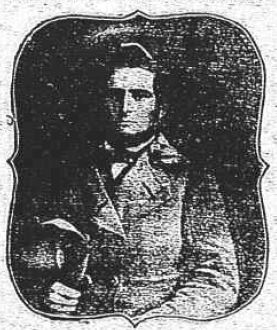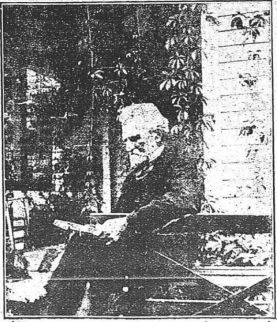
From a daguerrotype taken by John Powman
at Pine Plains in 1847.
Copied by Harry Jackson, Pine Plains.

From a photograph taken by Webster
at Louisville, Ky., in 1862.
Copied by Harry Jackson, Pine Plains.
PINE PLAINS HISTORIAN AND SOLDIER.
The Useful Life of a Historian and Soldier that is Being Spent in this Village. An Interesting Career.
One of the well known and highly esteemed residents of Pine Plains,1 sprightly and active as many a man twenty years younger, with intellect as clear and unimpaired as ever, occupying his mind in reading, writing and studying, while keeping himself in good physical trim by the cultivation of a productive garden lot suspending his labors for a pleasant chat with neighbors and friends who are always glad to talk with him, bearing his eighty-four years of busy life gracefully, is Mr. Isaac Huntting, whose latter years are being pleasantly and usefully passed in this village.
Mr. Huntting was born at "Chatham Four Corners," near Chatham,2 November 17, 1825, in a house taken away about 1870 to make room for the "Lew" Payn residence a little west of Chatham.
His father, the late Edward Huntting, after his marriage to Amanda Winans [1-7-2-10-11], emigrated from Stanford, Dutchess County, to Chatham in 1819, and purchased the farm which includes now a part of the present cemetery west of the village. In 1829 he sold that property and moved to Pine Plains on the farm, now part of the briarcliff farms, where he resided until his decease in 1884.
Here Isaac Huntting spent his youth and early life in farming, receiving meanwhile an academical education at Pokeepsie, Kinderhook and Great Barrington, Mass.
From boyhood he was a fine musician, playing pipe organ and piano with grace and skill, adding to his work the tuning of those instruments, which he did for many years, in fact until about twenty years ago. He was an artistic singer, and a very successful and popular teacher of both vocal and instrumental music. He retains his rich voice even now, and occasionally accepts an invitation to sing at a public entertainment.
At the age of 24 he engaged for a year with Bass, Clark and Dibble grocers, in New York city, and February 5, 1849, took passage on the barque J. W. Fannin, Capt. Norris, Master, for Galveston, Texas, en route to Austin, the capital of the state. At that time this was the most practicable route to Central Texas, and the vessel was twenty days on the voyage from New York to Galveston. Then a steamer up the bay and bayou to Houston, then a four horse stage over the prairie one hundred and eighty miles to Austin. A year later he returned via San Antonio, Indianola, New Orleans, by boat, to St. Louis and Wheeling on the Ohio, Pittsburg, Baltimore and New York to Pine Plains.
Three years later he settled in western Michigan, and engaged in lumbering, which brought intercourse with Chicago in shipping and marketing lumber. At Grand Rapids he became a member of the fraternity of Free and Accepted Masons, with which order he is still connected, being now an affiliated member of Stissing lodge No. 615.
In 1862, the fires of patriotism which had been kindled in his breast at the breaking out of the war of the rebellion, attained a force that led him to offer himself to the service of his country, and he was enrolled in the 21st Michigan Infantry with the rank of major. With this gallant regiment he participated in the battles of Perryville and Stone river, besides numerous other minor engagements and skirmishes, being compelled finally to resign on account of chronic liver trouble which developed in serious form, the result of the exposure and hardships of army life, and returned to his Michigan home. In that state he made a study of the Indian language, which was of great use to him in his subsequent work as historian. In 1876 he came again to Pine Plains and commenced gathering data, facts and traditions, for a history of this part of the county. In this work he was indefatigable, accuracy and absolute correctness being his rule and guide, he always asserting that incorrect history was worse than no history at all.
He made extensive research concerning the Moravian Missions in Pine Plains, and Sharon, writing of the missionaries and converted Indians, many of them to their decease. His sketches on these missions and other local history were published in the Amenia Times, Poughkeepsie Telegraph, Dutchess Farmer and Pine Plains Register, which sketches formed the basis of the compilation on the Moravian missions in Mason's History of Dutchess County, published in 1882, also what appears in that work of the history of Pine Plains, the latter being appropriated from what Mr. Huntting had either published or in manuscript, he giving access to the same to the compiler for the Pine Plains pages.
Mr. Huntting continued his researches until 1897, when at the urgent suggestion of the editor of the Pine Plains Register and other, he published his history of the Little Nine Partners, North East Precinct and Pine Plains.3
This was the greatest contribution to current history that could be made, and rescued from oblivion much valuable historical matter especially in the way of geneolgy [sic], that could not otherwise have been obtained, the oldest inhabitants and records from which he derived his facts having long since passed beyond the reach of mortal communication. Incidentally it may be of interest to state that when that history was published it had a comparatively small sale, and Mr. Huntting had several hundred copies left on his hands. Now the book cannot be got at any price, and as high as $25 has been offered for a copy.

From a kodak photograph taken by
Ella Bryan Moore at Shekomeko, 1909.
Copied by Harry Jackson, Pine Plains.
Mr. Huntting has also prepared a genealogy of the Hunttings of Dutchess County, which he has in a manuscript journal of about three hundred pages.
Besides local history he has written at various times articles on current topics, reminiscence, poetry and song, in all of which he has demonstrated a literary ability of high order. Many articles from his pen have been printed in these columns and been read with interest and pleasure.
As a companion and friend Mr. Huntting is highly esteemed, for he has the manners, not mannerisms, of the gentleman of the old school, and is ever a welcome visitor to the households of the first families in this and other communities where he is known.